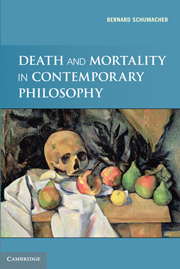Book contents
- Frontmatter
- Contents
- Preface
- Introduction
- Part One Human Personal Death
- Part Two Theory of Knowledge About Death
- 2 Scheler’s Intuitive Knowledge of Mortality
- 3 Heidegger’s Being-Towards-Death
- 4 Is Mortality the Object of Foreknowledge?
- 5 Inductive Knowledge of Death and Jean-Paul Sartre
- 6 Knowledge of Mortality Is Inseparable from the Relation to the Other
- 7 Death as the Object of Experience
- Part Three Does Death Mean Nothing To Us?
- Conclusion
- Bibliography
- Index of Names
- Index of Concepts
5 - Inductive Knowledge of Death and Jean-Paul Sartre
Published online by Cambridge University Press: 05 June 2012
- Frontmatter
- Contents
- Preface
- Introduction
- Part One Human Personal Death
- Part Two Theory of Knowledge About Death
- 2 Scheler’s Intuitive Knowledge of Mortality
- 3 Heidegger’s Being-Towards-Death
- 4 Is Mortality the Object of Foreknowledge?
- 5 Inductive Knowledge of Death and Jean-Paul Sartre
- 6 Knowledge of Mortality Is Inseparable from the Relation to the Other
- 7 Death as the Object of Experience
- Part Three Does Death Mean Nothing To Us?
- Conclusion
- Bibliography
- Index of Names
- Index of Concepts
Summary
After the critiques of Heidegger’s solution (“Being-towards-death”) formulated by Sternberger and Landsberg in the 1930s, and before those developed in recent years by Levinas, Derrida, and Macho, to cite only a few, Sartre is the first well-known philosopher who, while proposing an ontology different from Heidegger’s, elaborates his own concept of death in contrast to Being-towards-death – which he describes in Being and Nothingness as a “sleight of hand”. His principal aim is not to conduct an “exhaustive” and “detailed” investigation of death but to clarify Being-in-situation. He constructs his thanatology on the foundation of his ontology of freedom and his anthropology of Being-for-others, in which one for-itself (pour-soi) stands in a relation of conflict with another for-itself: the goal of Being-for-others is to reduce the other to an in-itself (en-soi). According to Sartre, I am not capable of expecting “my death”; death is not a conspicuous (insigne) possibility that is intrinsic to the for-itself, and it does not give meaning to the existence of the free for-itself. Death is extrinsic to life. It annihilates the meaning of the free projection of the possibilities of the for-itself, which, once it is dead, is definitively reduced to an in-itself, and the meaning of its past actions is henceforth conferred by the surviving for-itself. Other people, moreover, are indispensable if I am to arrive at a consciousness of my mortality. Recognizing, of course, with Heidegger along the lines of Epicurus’s argument that there is, strictly speaking, no such thing as an experience of death (understood as the state of death), Sartre maintains, contrary to Heidegger and Scheler, that only a detour by way of the experience of another’s death and by way of mourning leads to a recognition of one’s own mortality. Sartre’s reflection is a cornerstone in the debate on death and the meaning of life that left its mark the first part of the twentieth century; it seems to herald the present discussion, within the analytic tradition, of the meaning of life and the status of death as an evil (inasmuch as it deprives the subject of possibilities, interrupting the projection of his free plans for the future). Sartre’s position is one of the most original contributions to thanatology in the twentieth century, but it has not received the credit that it deserves, and it has too often been presented in outline form. In this chapter I will analyze step by step the train of thought developed by Sartre in Being and Nothingness, while questioning in particular the accuracy of his interpretation of Heidegger’s Being-towards-death. In this way I will discuss, first, the realist and idealist concepts of death; second, the possibility of expecting “my death”; third, death in relation to Sartre’s theory of meaning; and finally the concept of death as a victory of the other and as a situation limit.
- Type
- Chapter
- Information
- Death and Mortality in Contemporary Philosophy , pp. 91 - 111Publisher: Cambridge University PressPrint publication year: 2010



